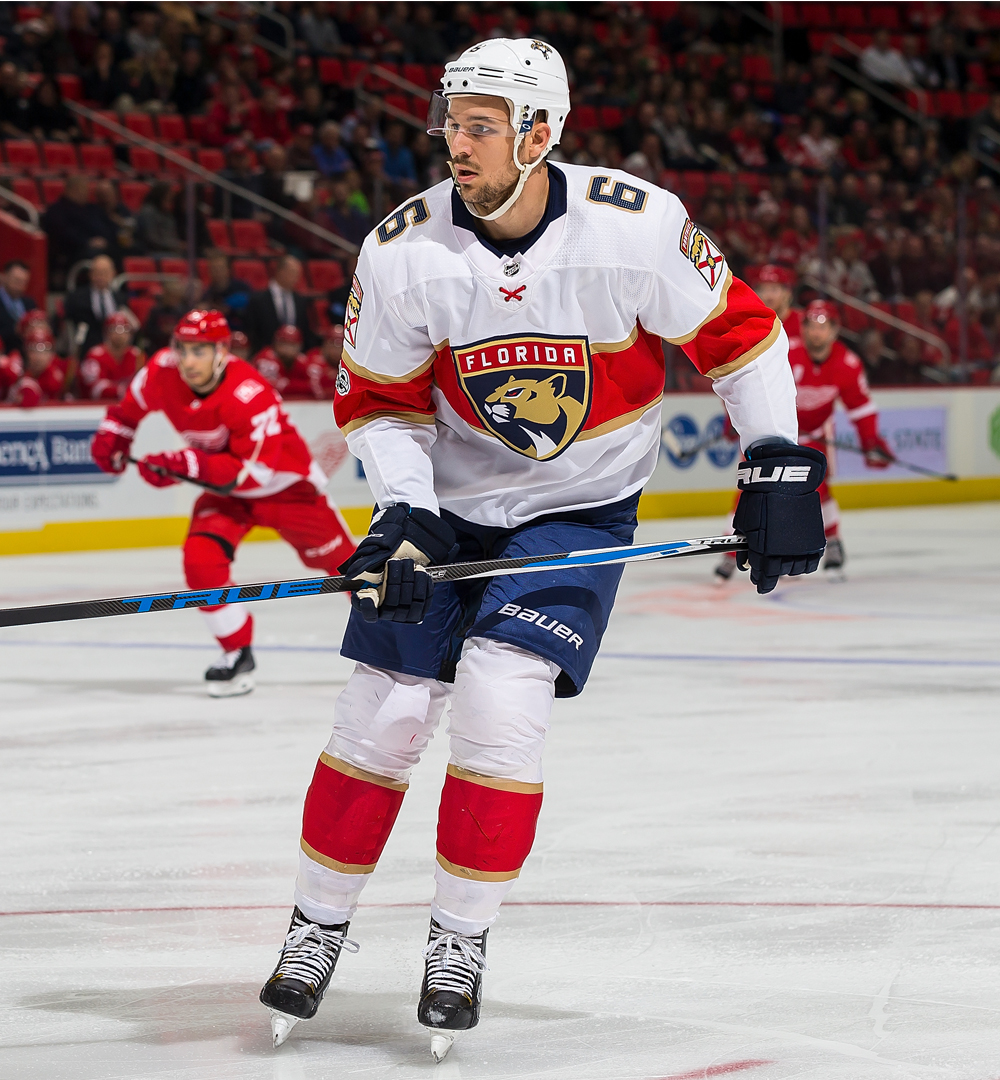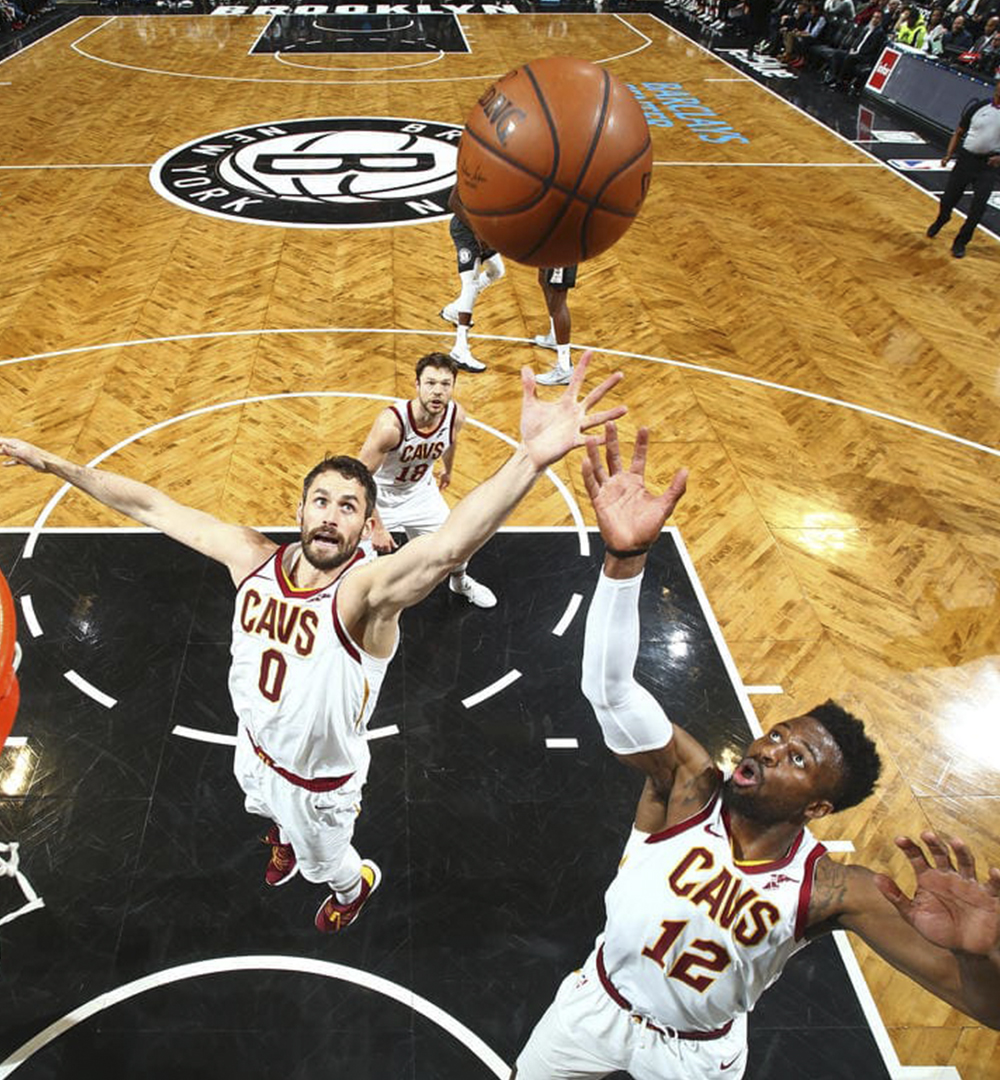Testimonials

Petro's Blog: Healthy Scratches & Unsung Heroes
by Alex Petrovic / December 15th, 2017
I still remember the first time I was a healthy scratch. It was October 22, 2015 in Chicago. I had been scratched before that in my career, but this was the first time where it really stung. I was a regular guy, someone who was expected to play all 82 games, coming out of the lineup after a rough game in Pittsburgh the game before.That's when I called Dr. Derek Anderson.
Derek has been our team's sports psychologist for about four years now. He's worked in the NHL, NBA and MLB, but he didn't really know much about hockey when he started. But the way he tells you how to think and just kind of where to put your thoughts really transcends the sport.From that game until now, he's been a huge help for me in my career.
When any of us need to talk to Derek, we don't need to make an appointment. It's an open-door policy and he's always around when we need him to help clear our heads. You can sit down in his office, pull him into the lounge, or just grab a bite to eat and talk about life. He's even had a couple of us over for dinner at his place a few times. I really think he's a huge part of our team that doesn't get a lot of recognition. He's kind of an unsung hero that has definitely helped a lot of guys in this locker room get to where they are. When you're in a rut, he's the guy that helps you get right back up.
When you sit down to talk to him, it usually starts off pretty simple. You know, the usual "Hey, how's your day going? Yada yada yada." From there, the conversation evolves into whatever is on your mind. We're actually pretty good buddies. In fact, a lot of guys are pretty good buddies with him on the team. After speaking to him, you'll feel like a million bucks. I think it's good to have a guy like that around because it's not something that the coaches should have to deal with. They need to be worried about our next opponent, not sitting down with us to talk about our feelings. That's a good thing though. They're focused on something that's going to help us succeed as a team. Meanwhile, Derek's there to help us succeed as individuals so that we can help the team.
I remember this one time, a few years back, when Dmitry Kulikov was going through a no-point drought for like 10 or 20 games - I don't remember the exact number. At some point, he and Barky were talking in their hotel room and Barky was just like "Hey, call Derek." So, of course, Kuli ended up calling him that night. They talked for a bit and the next game he went out and had a goal and an assist.
As you can see, Derek is a magical guy. When the healthy scratches started piling up for me earlier in the season, he really helped me keep my head on straight. I never want to get into that position again, so he just told me that the best thing I can do is just to remember how that whole situation made me feel and then use that. I'll tell you right now, it's not a good feeling.
When you're scratched for long periods of time, you're not secluded from the team, but you're also not really helping by being out of the lineup. I really, really hated that feeling. You can go home, try and stay positive, but it drags on you. I even lost a little sleep because of it. There are some guys that don't care, but I take that stuff seriously. It's been really good my get my feet back under me. Now that I'm back in the lineup, I've been playing a bit looser and with a lot more confidence. Derek told me that after every game, I should come up with one good thing that happened and one bad thing that happened that I can improve on for the next game and write them down. He said that once you get something on paper, it's a lot easier to go out and do it in practice.
It's doing little things like that that will keep you at your best. Even when things are going good, you can still improve on little stuff. And even though I've been back on the ice for a while now, I still usually talk to Derek about once a week either in person or on the phone. I know that I've been playing better lately, but as a team I think all of us are playing good defense. When the puck gets dumped in our zone, we're really supporting our partners right now. I think that before we were way too spread out. Now, we're a lot closer together and supporting each other. No one is just slapping the puck around and turning pucks over anymore. I think that before I was just kind of getting the puck and waiting for someone to call for it, wondering what to do with it. Now I'm just going back, moving my feet, getting my feet moving. When I do that, I feel like I get into games much quicker.
We've also had to make some adjustments since Lu went down. There's going to be a little less messing around with it down low. We've got to keep it simple. If you've got nothing, just get it off the glass and out, just simple plays. We don't need anything special or highlight-reel worthy. We can do that on the other end. Lu's been the backbone of the defense since I first got here. It sucked to see him injured on the ice. It was like "Ah, jeez, here we go." He's a huge guy to have in the room. There's nothing bad you can say about him. He makes huge saves at big moments. Thankfully, we've got Reims back there now and he's also a very solid goalie. As a defense, we're lucky to have two guys like that behind us.
And, of course, we've also got Derek.
- Petro.

NBA ramps up mental health program, setting new expectations for each team— details from a league memo
By Sam Amick / August 7, 2019
Bravo Royce White, Kevin Love, DeMar DeRozan, Keyon Dooling and anyone else who played a pivotal part in the NBA’s push toward improved mental health for its players. Here’s to all of the anonymous talents who spoke out behind the scenes as well, like the star who commissioner Adam Silver discussed in agonizing detail back in February when the perspective he shared at the Sloan Conference in Boston left everyone in the room – and the basketball world at large – contemplating this need for expedited change.
“When I meet with (NBA players who have expressed concern on this front), what strikes me is that they’re truly unhappy,’’ Silver told a room full of attendees back then. “A lot of these young men are generally unhappy.’’ With that problem in mind, the league has instituted the latest round of improvements on this front. Sources say the NBA issued a memo to all 30 teams on Wednesday detailing changes that will be required before the start of the 2019-20 season.
According to the memo, which was obtained by The Athletic, teams are now expected to:
• Retain and make available to players on a voluntary basis one to two mental health professionals who are licensed in their field and locality, and with experience in assessing and treating clinical mental health issues.
• Identify a licensed psychiatrist (M.D. or D.O.) to be available to assist in managing player mental health issues.
• Enact a written action plan for mental health emergencies.
• Put in place procedures for communicating to players and team staff the team’s practices with respect to privacy and confidentiality.
• Attend a Sept. 12 “health and wellness meeting” in Chicago where these matters will be discussed and analyzed even further.
As the memo chronicles, these efforts come after a string of other improvements in recent years. Since 2015, the league has made a clinical psychologist available to speak with players and team staff “regarding stress, pressure, healthy relationships and other wellness-related issues, and to provide crisis assistance and referrals to mental health-related services and information.” That psychologist, Derick Anderson, Psy.D., is deemed the “Lead Clinical Consultant for NBA Mind Health” and has prior experience working with pro athletes.
In 2017, the NBA retained the Jed Foundation (a mental health and wellness organization with experience in college and professional sports) to serve as an advisor to the league on mental health and wellness issues. In May 2018, the NBA “provided teams with recommended practices related to mental health and wellness, which have now been updated to reflect further input from team mental health providers, physicians, and player development directors, among others, including feedback received at the recent team mental health sessions at Las Vegas Summer League (in July).”
The progress, quite clearly, is continuing in a very substantive way. And as has been the case so often of late in this era of unprecedented player empowerment, it’s the players’ voices that have mattered most here too. For anyone who doesn’t remember the specifics of the situations relating to the aforementioned players, click those links above and read about the pivotal part they played along the way. Each of them made the choice to be vulnerable, sharing their struggles in the kind of way that advanced this important conversation. With the World Health Organization reporting in 2018 that more than 300 million people suffer from depression worldwide, there’s the shared hope that their efforts will continue making a meaningful difference beyond the league itself.
The National Basketball Players Association was integral in this process of creating a stronger support system, coordinating and communicating with the NBA at every step along the way (Dooling, it should be noted, is the Player Wellness Counselor of the NBPA’s mental health and wellness program that was launched last summer). The goal, according to sources, was to provide a wide range of resources for all sorts of scenarios – from the players who simply needed to talk to the ones who might be experiencing something far more serious and challenging. The league’s move to require a certain type of mental health infrastructure as opposed to simply suggesting it, both sides agreed, would create a level of consistency that was seen as important.

Mind games: Florida Panthers lean on sports psychology for on-ice edge
By Erin Brown / November 16, 2018
The Florida Panthers defenseman parks himself behind the net, watching as the opponents approach on a forecheck. He dips his shoulder to the right, then cuts left to skate with the puck. A few strides in, he passes up the boards to a teammate. The mundane play doesn’t result in a goal or even a scoring chance. In Matheson’s mind, though, the execution was just as he envisioned it over and over and over again.
“Everybody focuses so much time and energy — and money — on training your body,” said Matheson, who graduated from Boston College in 2015 with a degree in psychology. “Then everyone turns around and says, the old saying, ‘The game is 30 percent physical, 70 percent mental.’ “All right, if that’s the case, why isn’t anyone focusing on the mental side?” The Panthers, for one, are just as concerned with the 6 inches between their players’ ears as they are about the 6 feet between the pipes.
While the concept of sports psychology has been mainstream for decades, it is now growing in use. Florida is one of six NHL teams to list a sports psychologist among its medical, training or performance staff. Dr. Derick Anderson has consulted with the Cats for five years. A clinical psychologist who has also worked with the NFL, military and currently with the New York Mets, Anderson assists players in techniques to improve performance. Among the methods he has introduced: positive affirmation, meditation, journaling, goal setting, developing routines and focus on process over results and visualization — like Matheson employs in the example above. Through repetition, players can learn to maintain confidence after failure, manage emotions and anxiety, and approach their work with consistency.
“The best players put stock in the necessity for having to deal with their mental and emotional state,” Anderson said. “I say a lot of what we teach athletes are things we could use in our daily lives. They may look different, but we all have to deal with pressures and stressors and disappointments, failures.” Florida finished 2017-18 as one of the NHL’s hottest teams, winning 25 of its last 35 games. With little turnover during the offseason, expectations for a repeat were high.
“Everyone got used to playing with each other,” defenseman Alex Petrovic said of Florida’s finish. “We got used to the systems. When you’re preparing for a game, everybody already knows their jobs. It’s not a surprise to anyone.
“I think this year it wasn’t the same.” In the opening game, the Panthers lost starting goalie Roberto Luongo and fourth-line center Derek MacKenzie. Florida lost workhorse Matheson to a two-game suspension. Defenseman Mark Pysyk went down with an injury a couple games later.
Florida struggled to hold leads in six of its first nine games. The second period was of particular trouble as the Panthers were outscored 20-8 during that stretch. A revamped power play and penalty kill ranked among the bottom third in the league.
The team finished October last in the Atlantic Division with a 2-4-3 record, enough to toy with the psyche of the organization. “At this level, a lot of these guys, everybody thinks they’re such confidence guys and nothing shakes them,” Panthers coach Bob Boughner said. “They’re little kids at heart. There’s guys that lose confidence all the time.” The stress an average fan might experience over a team’s tough start is magnified to a professional athlete; Anderson explained.
“Not only are they human beings, they’re young human beings,” Anderson said. “They’re dealing with things on a very emotional level, and if you think about it, most of their lives they’ve been the hero in the story. They’ve never been the villain. When they’ve disappointed someone or a fan base or management or ownership or their co-workers, that’s a heavy burden for someone in their 20s to have to bear.” But Anderson noted players who are successful over time can cope and insulate themselves from these stressors by developing “healthy coping mechanisms and strategies.” Petrovic added mental training to his preparation in juniors when sports psychologist Derek Robinson introduced the blueliner to visualization.
Petrovic keeps a list of situations he expects to encounter during a game and thinks about each from a first-person point of view: getting his shots through from the blueline; moving the puck quickly through the neutral zone; staying on the correct side of opponents in his own end. He also takes into account the feeling of the puck on his stick and fans in the crowd. “During the course of a game, there are so many different plays that happen,” Petrovic said. “Things happen so quickly. When you visualize, your kind of slow down a little bit, or they help things to slow down during the game.
“When I first started out doing it, it’s very tough to visualize that type of stuff. But over the years you just get better at it. Now I’m at a point where I can visualize. I can see everything in my mind’s eye.” Petrovic also incorporates meditation before bedtime (for sleep) and warmups (for energy) as part of his practice. “I’ll do a body scan from head-to-toe, just kind of where I feel tension in my body, take a deep breath and release that tension, wherever it is — my neck or my jaw or my legs,” he said.
Matheson sometimes visualizes improving a skill, often being mindful of his actions during a practice as if he were facing in-game pressure. “It’s important to not really just go through the motions and just do it because you’re doing it,” Matheson said. “Instead, actually envision what that would be like in the game.” Research shows the repetition of an action in one’s thoughts can sometimes have the same effect as if physically practicing the skill, Anderson said.
“Remember the brain really doesn’t know the difference between you doing it and the imagery that pops up in your head,” he said. “Skill acquisition can happen in a very real way through visualization.” Panthers coaches make it part of their duty to build up players through positive affirmation, too. Boughner said it is easy to focus on negatives, but “our staff, we choose to do the opposite.” “Whether it’s a team tape or something like that we’ll show something that pumps the guys up a little bit, gets them in a good frame of mind,” Boughner said.
Sometimes the attention is individual. Before the team’s recent three-game homestand, the coach pulled aside an unnamed player who has been struggling to show him a highlight reel of everything he has been doing right. “It was one of our younger players, but it’s one of those things where he needed a boost and some confidence,” Boughner said. “We built him out a shift tape of all his goals last year just to get him back mentally, feeling good about himself with positive reinforcement.
Florida’s persistence in staying optimistic in their minds and on the ice is paying off. Since returning from a two-game series in Finland against the Winnipeg Jets, the Panthers swept their three-game homestand against the Edmonton Oilers, New York Islanders and Ottawa Senators. Their power play picked up a goal in each of the contests, while the penalty kills limited opponents to just one goal in 12 attempts. Luongo is back in net. Florida is nearly back to full health. On Tuesday night, Florida extended its win streak to five games, matching its longest since the end of last season.
The mood in the locker room following victories has been jovial, the practices between contests more fun. There’s laughter and cheering, jokes and smiles. “It’s fun coming to the rink when you’re winning, even when you’re just playing well,” Boughner said. “There’s a lot of pressure on everybody, right? The players, coaches, everyone. When you get rolling and start playing better it allows you to come to the rink, have some fun and go home feeling good about yourself.” Win or lose, the Panthers are always working on it.

Mental Health
By Elizabeth Strong / January 27th, 2021
I started my law enforcement career in 2005 as a 911 Public Safety Dispatcher. After a few years of service, I saw the mental health challenges from the stress and trauma of the job that was not only affecting my coworkers, but also me. I found myself wondering if there was a way to help. This wasn't a topic that was easily talked about nor accepted when it was brought up.
I cautiously brought up the idea with a few coworkers and they acknowledged the need but didn't want to continue the conversation. Seven years later in my new role as a High-Tech Crime Training Specialist, I was sitting in a training where Dr. Derick was talking about how law enforcement duties affect your mental health. I immediately felt the truth of his words and knew his words were not just moving me, but every law enforcement professional in the room – it was powerful.
I had the proverbial “light bulb moment” and immediately knew I wanted to further my education on the topic. Dr. Derick may not have realized it, but he set the trajectory of my professional future within 30 minutes of speaking! Since growing my career in law enforcement wellness, I have reached back out to Dr. Derick and he has been the most dedicated, encouraging mentor.
I continue my work in law enforcement mental health and wellness knowing that without Dr. Derick I would never have reached the place I am today. He is, not only, a true pioneer in criminal justice mental health but an advocate for the wellness of each path he crosses.
- Elizabeth
Phone
+1 305 987 6873
Email contact
invictusperformanceinc@gmail.com
Email contact
contact@invictusperformance.us

